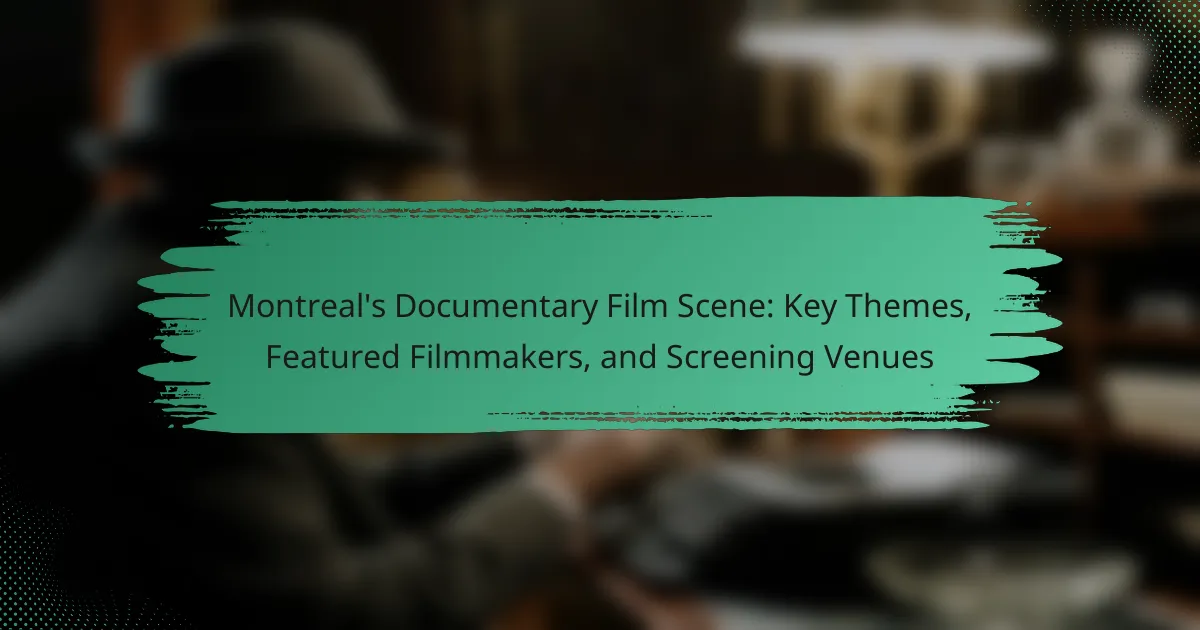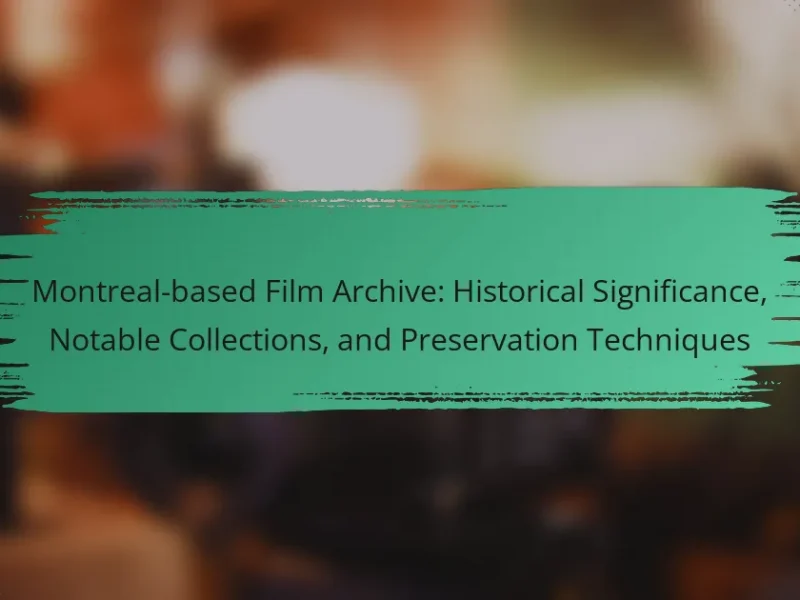Montreal’s documentary film scene is characterized by its vibrant diversity and cultural richness, prominently showcased through events like the Montreal International Documentary Festival (RIDM). This festival highlights a variety of documentary styles and subjects, reflecting the influence of local cultural communities and acclaimed filmmakers such as Alanis Obomsawin, who focuses on Indigenous issues. The bilingual environment of the city fosters innovative storytelling, supported by educational institutions like Concordia University that nurture emerging talent. The article will explore the significant role of festivals in enhancing the local documentary landscape, the integration of technology in storytelling, and the growing emphasis on social issues, including climate change and activism, within Montreal’s documentary filmmaking community.

What defines Montreal’s Documentary Film Scene?
Montreal’s documentary film scene is defined by its vibrant diversity and cultural richness. The city hosts numerous film festivals, such as the Montreal International Documentary Festival (RIDM). This festival showcases a wide range of documentary styles and subjects. Montreal is home to acclaimed filmmakers like Alanis Obomsawin, known for her focus on Indigenous issues. The presence of various cultural communities influences the themes explored in local documentaries. Additionally, the city’s unique bilingual environment fosters innovative storytelling. Educational institutions, like Concordia University, contribute to the development of new talent. Overall, the documentary scene reflects Montreal’s dynamic cultural landscape and commitment to social issues.
How has Montreal’s documentary film scene evolved over the years?
Montreal’s documentary film scene has evolved significantly over the years. Initially, it was characterized by a focus on social issues and cultural narratives. In the 1970s, filmmakers began to explore personal and experimental forms of documentary. The 1990s saw an increase in international collaborations and the emergence of notable festivals. By the 2000s, technology advancements allowed for more diverse storytelling methods. Today, Montreal’s scene is recognized for its vibrant community and innovative approaches. The city hosts several prominent festivals, such as the Montreal International Documentary Festival (RIDM), which showcases local and international works. This evolution reflects a growing appreciation for documentary as a vital storytelling medium.
What historical events have influenced documentary filmmaking in Montreal?
The Quiet Revolution significantly influenced documentary filmmaking in Montreal. This period, occurring in the 1960s, marked a shift towards Quebec nationalism. Filmmakers began to explore social and political themes in their works. The rise of the National Film Board of Canada also played a crucial role. Established in 1939, it provided resources and support for documentary filmmakers. The emergence of new technologies in the late 20th century further transformed the landscape. Digital cameras and editing software made filmmaking more accessible. Additionally, major cultural events, such as Expo 67, showcased documentaries to a wider audience. These factors collectively shaped the documentary film scene in Montreal.
How do local culture and society shape the themes in Montreal documentaries?
Local culture and society significantly influence the themes in Montreal documentaries. The city’s multicultural environment fosters diverse storytelling. Filmmakers often explore themes of identity, immigration, and community. This reflects Montreal’s rich tapestry of cultures and languages. Social issues like gentrification and economic disparity also emerge in these films. Documentaries often highlight local history and heritage, showcasing Montreal’s unique cultural landscape. The city’s vibrant arts scene inspires creative expression in documentary filmmaking. These factors collectively shape the narratives presented in Montreal’s documentaries.
What are the key themes explored in Montreal’s documentaries?
Montreal’s documentaries explore themes of identity, culture, and social justice. These films often reflect the city’s diverse population and multicultural influences. Issues related to immigration and community are frequently highlighted. Environmental concerns and urban development are also prominent themes. Additionally, filmmakers examine historical narratives and their impact on contemporary society. Personal stories and individual experiences provide depth to these themes. The exploration of art and creativity is another significant aspect. Overall, Montreal’s documentaries offer a rich tapestry of perspectives and insights.
Which social issues are commonly addressed in Montreal’s documentary films?
Montreal’s documentary films commonly address social issues such as immigration, Indigenous rights, and social inequality. These films often explore the challenges faced by immigrant communities in integrating into Canadian society. They highlight the struggles of Indigenous peoples regarding land rights and cultural preservation. Social inequality is depicted through narratives that examine poverty and systemic discrimination. Documentaries also tackle environmental issues, reflecting on climate change and urban development impacts. Mental health awareness and the experiences of marginalized groups are additional focal points. These themes resonate with local audiences and contribute to broader social discourse.
How do filmmakers incorporate local history into their narratives?
Filmmakers incorporate local history into their narratives by conducting thorough research on historical events and figures. They often engage with local communities to gather personal stories and oral histories. This approach adds authenticity and depth to their films. Filmmakers may also use archival footage and photographs to visually represent historical contexts. By integrating these elements, they create a connection between past and present. Documentaries like “The Last of the Ice” showcase Montreal’s historical relationship with climate change, illustrating how local history informs current issues. This method enriches storytelling and engages audiences with their cultural heritage.
Who are the prominent filmmakers in Montreal’s documentary scene?
Prominent filmmakers in Montreal’s documentary scene include Jennifer Baichwal, Alanis Obomsawin, and Philippe Falardeau. Jennifer Baichwal is known for her work on environmental issues and social justice. Alanis Obomsawin has a significant body of work focusing on Indigenous rights and culture. Philippe Falardeau is recognized for his acclaimed documentaries and feature films that explore human experiences. Their contributions have shaped the landscape of documentary filmmaking in Montreal. Each filmmaker has received multiple awards, showcasing their impact on the industry. Their films often premiere at prestigious festivals, further highlighting their prominence.
What unique styles do featured Montreal filmmakers bring to their work?
Featured Montreal filmmakers bring distinct styles characterized by cultural diversity and innovative storytelling techniques. Their works often blend personal narratives with broader social themes. Many filmmakers utilize a documentary format that emphasizes authenticity and raw emotion. Visual aesthetics frequently include vibrant colors and dynamic cinematography. Additionally, there is a notable emphasis on community involvement and collaboration in their projects. Many filmmakers also incorporate elements of experimental cinema. This approach allows for unique narrative structures and audience engagement. The fusion of various cultural influences enriches the storytelling landscape in Montreal’s film scene.
Which awards and recognitions have notable Montreal documentarians received?
Notable Montreal documentarians have received various prestigious awards. This includes the Canadian Screen Awards, where they have been recognized for excellence in documentary filmmaking. Additionally, the Jutra Awards have honored their contributions to the Quebec film industry. Some documentarians have also received accolades from international film festivals, such as the Sundance Film Festival. Recognition from the Hot Docs Canadian International Documentary Festival is another testament to their impactful work. Furthermore, the Governor General’s Awards have acknowledged their artistic achievements. These awards reflect the significant influence of Montreal’s documentary filmmakers on both national and international stages.
How do screening venues contribute to the documentary film culture in Montreal?
Screening venues play a crucial role in shaping the documentary film culture in Montreal. They provide essential spaces for filmmakers to showcase their work. These venues facilitate audience engagement and discussion, fostering a community around documentary storytelling. They host film festivals, such as the Montreal International Documentary Festival, which highlights local and international talent. Screening venues also offer workshops and panels that educate filmmakers and audiences alike. The diversity of venues, from independent theaters to cultural institutions, enhances accessibility to documentary films. This variety attracts a broad audience, enriching the cultural landscape of Montreal. Overall, screening venues are vital in promoting and sustaining the city’s documentary film scene.
What are the most popular venues for screening documentaries in Montreal?
The most popular venues for screening documentaries in Montreal include the Cinémathèque québécoise, the Montreal Museum of Fine Arts, and the National Film Board of Canada. The Cinémathèque québécoise is renowned for its extensive collection of films and regular documentary screenings. The Montreal Museum of Fine Arts often features documentary films that align with its exhibitions. The National Film Board of Canada is dedicated to showcasing Canadian documentaries and hosts various screenings throughout the year. These venues are well-regarded for their contributions to the local documentary film scene.
How do these venues support local filmmakers and their projects?
Venues in Montreal support local filmmakers by providing screening opportunities and resources. They host film festivals that showcase local talent, increasing visibility for filmmakers. These venues often offer workshops and networking events to foster collaboration. They provide access to equipment and spaces for filming and editing. Many venues also engage in partnerships with local organizations to fund projects. Additionally, they promote films through marketing and outreach efforts. This multifaceted support helps local filmmakers grow their careers and reach wider audiences.

What role do festivals play in Montreal’s documentary film scene?
Festivals play a crucial role in Montreal’s documentary film scene. They provide platforms for filmmakers to showcase their work. Events like the Montreal International Documentary Festival highlight diverse narratives. These festivals foster networking opportunities among industry professionals. They also attract international audiences and critics, enhancing visibility. Additionally, festivals often feature workshops and panels, promoting skill development. The presence of these events contributes to Montreal’s reputation as a documentary hub. Overall, festivals significantly enrich the local documentary landscape.
How do film festivals promote documentary films in Montreal?
Film festivals in Montreal promote documentary films through various strategies. They provide a platform for filmmakers to showcase their work. Festivals like the Montreal International Documentary Festival (RIDM) highlight innovative storytelling. They also facilitate networking opportunities for filmmakers and industry professionals. These festivals often include panels and discussions to engage audiences. Additionally, they attract media coverage, increasing visibility for featured documentaries. Audience awards at festivals can also boost a film’s recognition. Overall, film festivals play a crucial role in elevating the documentary film landscape in Montreal.
What are the major documentary film festivals held in Montreal?
The major documentary film festivals held in Montreal are the Montreal International Documentary Festival (RIDM) and the Festival du Nouveau Cinéma (FNC). The Montreal International Documentary Festival, established in 1998, showcases a diverse range of documentary films from around the world. It emphasizes innovative storytelling and offers various awards. The Festival du Nouveau Cinéma, founded in 1971, features a section dedicated to documentary films. It highlights contemporary works and promotes new filmmakers. Both festivals contribute significantly to Montreal’s vibrant documentary film scene.
How do these festivals impact audience engagement with documentaries?
Documentary film festivals significantly enhance audience engagement with documentaries. They provide a platform for filmmakers to showcase their work directly to viewers. This direct interaction fosters a sense of community among audiences and creators. Festivals often include Q&A sessions, which allow viewers to engage with filmmakers and discuss the documentary’s themes. According to a study by the International Documentary Association, festivals increase viewer interest in documentary films by 40%. The communal viewing experience at festivals also amplifies emotional responses to the content. Overall, festivals serve as a catalyst for deeper audience connection and appreciation of documentary storytelling.
What challenges do Montreal documentary filmmakers face?
Montreal documentary filmmakers face several challenges. Funding is a significant issue, as many projects rely on grants and limited public funding. The competitive landscape makes securing financial support difficult. Additionally, filmmakers encounter logistical obstacles, such as obtaining permits for shooting in public spaces. There is also the challenge of balancing artistic vision with audience expectations. Market saturation can lead to difficulties in distribution and visibility for new films. Finally, filmmakers often grapple with the evolving technology landscape, requiring constant adaptation to new tools and platforms.
How do funding and resources affect documentary production in Montreal?
Funding and resources significantly impact documentary production in Montreal. Access to financial support enables filmmakers to cover essential costs like equipment, crew salaries, and post-production. Various grants from institutions such as Telefilm Canada and the Quebec Film and Television Council provide crucial funding opportunities. Additionally, local production companies often collaborate with independent filmmakers, pooling resources for larger projects. The availability of grants can influence the themes and scope of documentaries produced. Limited funding may restrict filmmakers to smaller, more personal stories. Conversely, increased resources allow for ambitious projects with broader narratives. Overall, the level of funding directly correlates with the diversity and quality of documentary films produced in Montreal.
What are the common distribution challenges for Montreal documentaries?
Montreal documentaries face several common distribution challenges. Limited access to funding is a significant barrier for many filmmakers. This restricts their ability to market and distribute their films effectively. Competition with larger, more established productions also poses a challenge. Independent documentaries often struggle to secure screening slots at major festivals. Additionally, the language barrier can hinder outreach to broader audiences. Many documentaries are produced in French, limiting their distribution potential in English-speaking markets. Finally, the rise of digital platforms has created a crowded landscape, making it difficult for individual films to stand out. These factors collectively complicate the distribution process for Montreal documentaries.

What future trends can be anticipated in Montreal’s documentary film scene?
Montreal’s documentary film scene will likely see increased integration of technology. Virtual reality and augmented reality are expected to enhance storytelling. Filmmakers are exploring interactive formats that engage audiences more deeply. Additionally, there is a growing emphasis on social issues and activism. Documentaries addressing climate change and social justice are gaining traction. The rise of streaming platforms is also influencing production and distribution methods. More local filmmakers are likely to leverage these platforms for broader reach. Collaborations between artists and communities may become more common, fostering diverse narratives.
How is technology influencing documentary filmmaking in Montreal?
Technology is significantly influencing documentary filmmaking in Montreal. Advanced digital cameras have made filming more accessible and affordable. Filmmakers can now capture high-quality footage with compact equipment. Editing software has also evolved, allowing for faster and more sophisticated post-production processes. This democratization of technology enables more voices to be heard in the documentary space. Streaming platforms provide wider distribution opportunities for local filmmakers. Virtual reality and augmented reality are being explored to create immersive storytelling experiences. These technological advancements are reshaping how documentaries are produced and consumed in the city.
What role do streaming platforms play in the future of Montreal documentaries?
Streaming platforms significantly enhance the future of Montreal documentaries by providing broader access and visibility. These platforms allow local filmmakers to reach global audiences, increasing their potential viewership. They also offer diverse content categories, enabling niche documentaries to find their audience. Additionally, streaming platforms often support independent projects through funding and distribution opportunities. According to a report from the Canadian Media Fund, streaming services have increased the production budget for Canadian documentaries by 30% in recent years. This financial backing fosters innovation and creativity in storytelling. Furthermore, the convenience of on-demand viewing aligns with contemporary viewing habits, attracting younger audiences to documentary films. Overall, streaming platforms are integral to the evolution and sustainability of Montreal’s documentary film scene.
How are emerging filmmakers shaping the next generation of documentaries?
Emerging filmmakers are reshaping the next generation of documentaries by incorporating innovative storytelling techniques. They utilize technology such as virtual reality and interactive formats to enhance viewer engagement. These filmmakers often focus on underrepresented voices and diverse narratives. Their work reflects contemporary social issues, making documentaries more relatable to younger audiences. They also leverage social media for distribution, reaching wider audiences beyond traditional platforms. This shift in approach has led to a more democratized film-making process. As a result, documentaries are becoming more accessible and varied in style. Emerging filmmakers are setting trends that challenge conventional documentary norms.
What tips can aspiring filmmakers follow to succeed in Montreal’s documentary scene?
Aspiring filmmakers can succeed in Montreal’s documentary scene by networking with local filmmakers and industry professionals. Building relationships can lead to collaborations and mentorship opportunities. Attending film festivals, such as the Montreal International Documentary Festival, can provide exposure to new trends and audiences. Participating in workshops and training programs can enhance skills and knowledge of the documentary craft. Utilizing local resources, such as production grants and funding opportunities, can help finance projects. Engaging with the community and addressing local issues can resonate with audiences and create impactful narratives. Finally, staying informed about industry developments through local film organizations can keep filmmakers connected and relevant.
How can filmmakers effectively network within the Montreal documentary community?
Filmmakers can effectively network within the Montreal documentary community by attending industry events. Events such as the Montreal International Documentary Festival foster connections among professionals. Participating in workshops and panels provides opportunities for skill development and networking. Engaging with local film schools can help filmmakers meet emerging talent and experienced mentors. Joining organizations like the Quebec Documentary Association offers access to resources and networking events. Utilizing social media platforms to connect with local filmmakers enhances visibility and collaboration opportunities. Collaborating on projects with other filmmakers builds relationships and expands networks. Networking within this community can lead to valuable partnerships and career advancements.
What resources are available for documentary filmmakers in Montreal?
Montreal offers various resources for documentary filmmakers. The city has multiple production companies specializing in documentary films. Organizations like the National Film Board of Canada provide funding and support. Filmmakers can access training programs at institutions like Concordia University. The Montreal International Documentary Festival showcases local and international works. Additionally, local grants are available from the Conseil des arts de Montréal. Networking opportunities exist through events and workshops hosted by industry groups. Filmmakers can also utilize co-working spaces designed for creatives. These resources collectively enhance the documentary filmmaking landscape in Montreal.
Montreal’s documentary film scene is characterized by its vibrant diversity, cultural richness, and a strong emphasis on social issues. The article explores key themes such as identity, immigration, and social justice, highlighting the influence of local culture and historical events on documentary narratives. Prominent filmmakers, including Alanis Obomsawin and Jennifer Baichwal, are recognized for their contributions, while various screening venues and festivals play a crucial role in promoting and supporting local talent. Additionally, the article addresses the challenges filmmakers face, including funding and distribution, and discusses future trends driven by technology and emerging voices in the industry.


